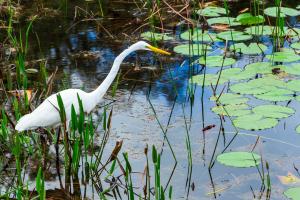Louisiana Tour Company Highlights the Ecological Importance of Louisiana’s Swamps
Swamps are not just a backdrop for photographs. They provide essential services that impact everything from water quality to flood protection”
MARRERO, LA, UNITED STATES, July 17, 2025 /EINPresswire.com/ -- The wetlands of Louisiana, particularly its swamps, play a critical role in maintaining the state’s environmental stability and biodiversity. As sea levels rise and development continues to encroach on natural habitats, Louisiana Tour Company is encouraging public awareness about the ecological significance of these vital landscapes.— Milton Walker Jr.
Owner Milton Walker Jr. has emphasized the importance of educating both visitors and residents about the irreplaceable functions that swamps serve within Louisiana’s ecosystem. While often associated with tourism and recreation, the state’s swamp systems offer much more than scenic boat rides and wildlife encounters.
"Swamps are not just a backdrop for photographs. They provide essential services that impact everything from water quality to flood protection," said Walker.
Swamps function as natural water filters. The dense vegetation and organic matter within these wetlands trap pollutants, sediment, and excess nutrients, improving the quality of water that eventually flows into rivers, lakes, and the Gulf of Mexico. These natural filtration processes help protect downstream ecosystems, fisheries, and drinking water sources from contamination.
In addition to their role in water purification, swamps also act as massive sponges during periods of heavy rainfall and storm surge. The saturated soils and dense plant roots absorb and slow the movement of water, reducing the impact of flooding on nearby communities. In a region frequently affected by tropical storms and hurricanes, this flood mitigation capacity is an essential component of disaster resilience.
The vegetation in swamp systems also plays a significant role in carbon storage. Trees, shrubs, and aquatic plants absorb carbon dioxide during photosynthesis and store it within their biomass and root systems. This carbon sequestration helps to reduce the concentration of greenhouse gases in the atmosphere, contributing to climate regulation on a regional scale.
Louisiana’s swamps support a complex web of biodiversity. These wetlands serve as habitat for hundreds of species, including reptiles, amphibians, birds, fish, and insects. Many migratory birds depend on these ecosystems during seasonal transitions, and several native species rely entirely on swamp environments for breeding, feeding, and nesting.
Loss of swamp habitat leads to direct consequences for both wildlife and humans. When wetlands are drained, filled, or degraded through pollution or invasive species, the ecological balance becomes disrupted. Species decline, water quality diminishes, and storm damage becomes more severe. In many cases, these changes are irreversible, making conservation efforts even more urgent.
Economic impacts are also tied to the health of swamp ecosystems. Louisiana’s fisheries, including shrimp, crab, and oyster industries, depend heavily on the nursery habitats provided by coastal wetlands. Recreational activities such as birdwatching, hunting, and eco-tourism also contribute to local economies and rely on the continued viability of swamp systems.
Walker noted that environmental stewardship begins with awareness. Tour companies that operate in wetland regions have a unique opportunity to educate the public about the importance of these habitats while promoting responsible interaction with the environment. Through guided swamp tours, visitors can observe the delicate relationships between plant life, wildlife, and hydrology in real-time.
Educational tours often include discussions on erosion, land loss, conservation efforts, and the cultural history of the region. Louisiana’s swamp culture, deeply rooted in Cajun and Creole traditions, reflects a longstanding connection between communities and the land. Preserving these landscapes also preserves cultural identity and intergenerational knowledge about sustainable living.
Coastal erosion remains one of the most pressing environmental challenges facing the state. The conversion of wetlands to open water has accelerated over the last century due to human activity and natural forces. The protection and restoration of swamp systems are recognized as key components of any comprehensive coastal resilience strategy.
Restoration projects across the region aim to reintroduce native vegetation, remove invasive species, and rebuild sediment foundations through controlled water diversion. These efforts are supported by a combination of federal, state, and private partnerships, and their success depends in part on public support and education.
Louisiana Tour Company continues to promote environmental awareness through tourism that respects and showcases the importance of natural habitats. Walker encourages engagement with the swamps not just as destinations, but as living systems that support both ecological health and community well-being.
Morgan Thomas
Rhino Digital, LLC
+1 504-875-5036
email us here
Visit us on social media:
Facebook
Legal Disclaimer:
EIN Presswire provides this news content "as is" without warranty of any kind. We do not accept any responsibility or liability for the accuracy, content, images, videos, licenses, completeness, legality, or reliability of the information contained in this article. If you have any complaints or copyright issues related to this article, kindly contact the author above.


